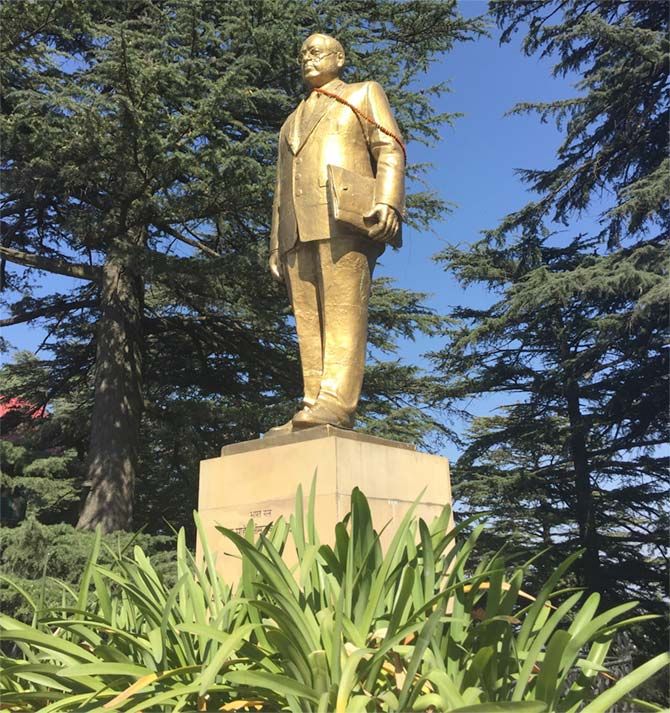'Ambedkar's ideas have their own teeth -- if you don't have an appetite for them, you can't swallow them.'
 "Everyone wants Ambedkar and everyone has his own Ambedkar -- like a saffron, red or blue Ambedkar. Everyone wants to use Ambedkar's ideology in a selected manner for doing politics."
"Everyone wants Ambedkar and everyone has his own Ambedkar -- like a saffron, red or blue Ambedkar. Everyone wants to use Ambedkar's ideology in a selected manner for doing politics."
"But Ambedkar's ideas have their own teeth -- if you don't have an appetite for them, you can't swallow them," said Professor Badri Narayan*, a leading voice on Dr B R Ambedkar's legacy, speaking at the Khushwant Singh Literary Festival in Kasauli.
Rediff.com's Archana Masih was all ears along with a attentive audience on a cool Sunday morning.
Political parties are busy appropriating Ambedkar. He is being used by the marginalised to become empowered and by the powerful for maintaining control of power. These are some of the contradictions about Ambedkar.
Ambedkar never did popular politics in Uttar Pradesh. He was born in Maharashtra, but his ideas took shape in UP. The first Dalit party came to power in UP. His ideas travelled to the Hindi regions of Bihar and UP.
Everyone wants Ambedkar and everyone has his own Ambedkar -- like a saffron, red or blue Ambedkar.
Everyone wants to use Ambedkar's ideology in a selected manner for doing politics, and that's another contradiction.
So Ambedkar's image is very vulnerable -- everyone wants to appropriate it.
Ambedkar's ideas are very critical, they have their own teeth -- if you don't have an appetite for them, you can't swallow them and there are various forces that are trying to appropriate that image.
Though he never did politics in UP there are more than 60,000 statues made by villagers in the villages of UP.
Kanshi Ram and Mayawati told MLAs to give a certain amount of their fund to construct these statues in villages.
These are not just statues, these are places where rituals, pujas and jayantis also take place. Dalit orchestras perform folk songs and disseminate his values.
Outlook did a survey recently on the great men of India, and Ambedkar was on the top, and Nehru was third. Most entries for this survey came from UP because UP has produced an intellectual class of Dalits and they are responding to the cause.
Ambedkar's image is multi-sided, it is not monolithic like Nehru's that always show him in a coat. But Ambedkar's image has space, you can negotiate with it. You can create it in your own way.
In one statue Ambedkar wears a black, red or blue coat; he has different hairstyles; some statutes show him with glasses, some without -- so everyone has imagined him differently.
The imagined Ambedkar is more powerful than the fixed Ambedkar.
This power of imagining Ambedkar gives him popularity. If the power of imagining him was taken away from people, it will diminish his image.
In the first two phases, Mayawati and Kanshi Ram provided space for people to imagine Ambedkar in their own way with the freedom to make his statues but later on Mayawati ordered that only the state could make statues of Ambedkar.
This was a wrong decision because it took away the power of imagination from the people. By this it showed that only the state had the right to imagine Ambedkar, not the public.
The true meaning of Ambedkar lies in the imagining by the people. If they stop that, the power of Ambedkar will die.
Ambedkar belongs to those who are marginalised, disempowered and struggling for a better life -- not those who are trying to control people and power.
He is a useful image for the struggle of the marginalised.
But if you use Ambedkar after that, you are misusing him and then you are going to lose the battle because Ambedkar is not going to help you create a hegemonic power. His image emerged for empowering the marginalised.
Anyone can use Ambedkar, but if you don't have an appetite for it, you will lose it just the way one party is going to lose.
They are trying everything to use Ambedkar, but everyday they are losing.
*Dr Badri Narayan, who teaches at the Centre for the Study of Discrimination and Exclusion School of Social Sciences at Jawaharlal Nehru University, is the author of several books -- Kanshiram: Leader of the Dalits (Penguin), The Making of the Dalit Public in North India: Uttar Pradesh, 1950-present (OUP), Fascinating Hindutva: Saffron Politics and Dalit Mobilization (Sage), Women Heroes and Dalit Assertion in North India (Sage) and Multiple Marginalities: An Anthology of Identified Dalit Writings (Manohar).
IMAGE: A statue of Dr B R Ambedkar in Shimla, Himachal Pradesh. Photograph: Archana Masih/Rediff.com











 © 2025
© 2025